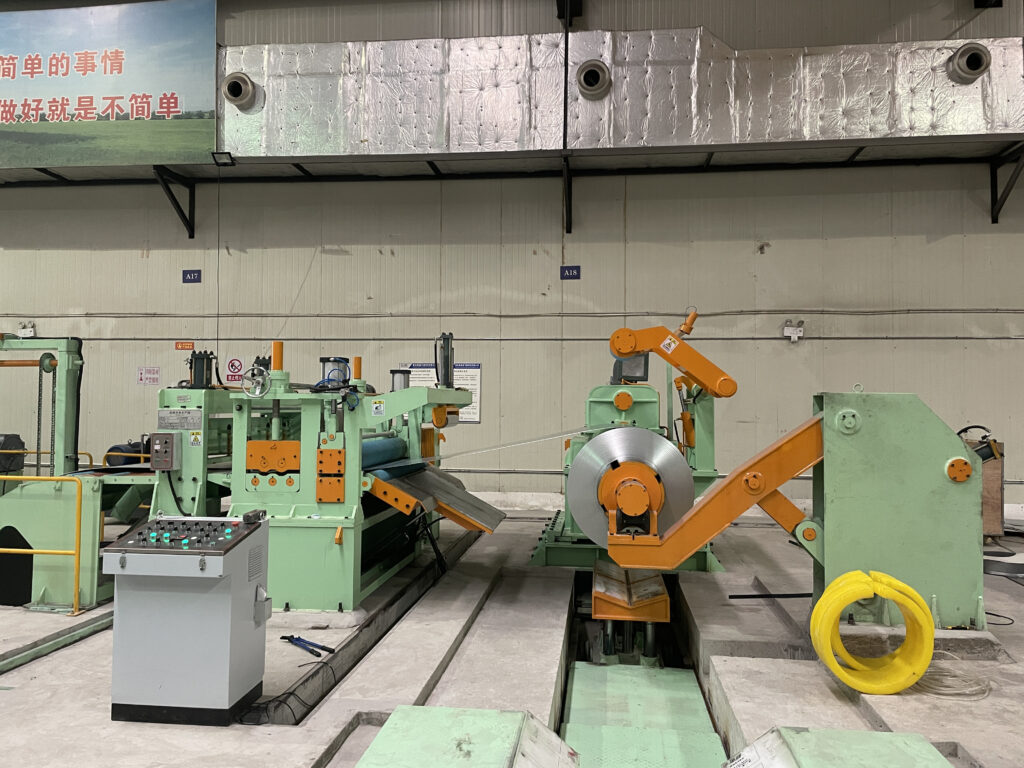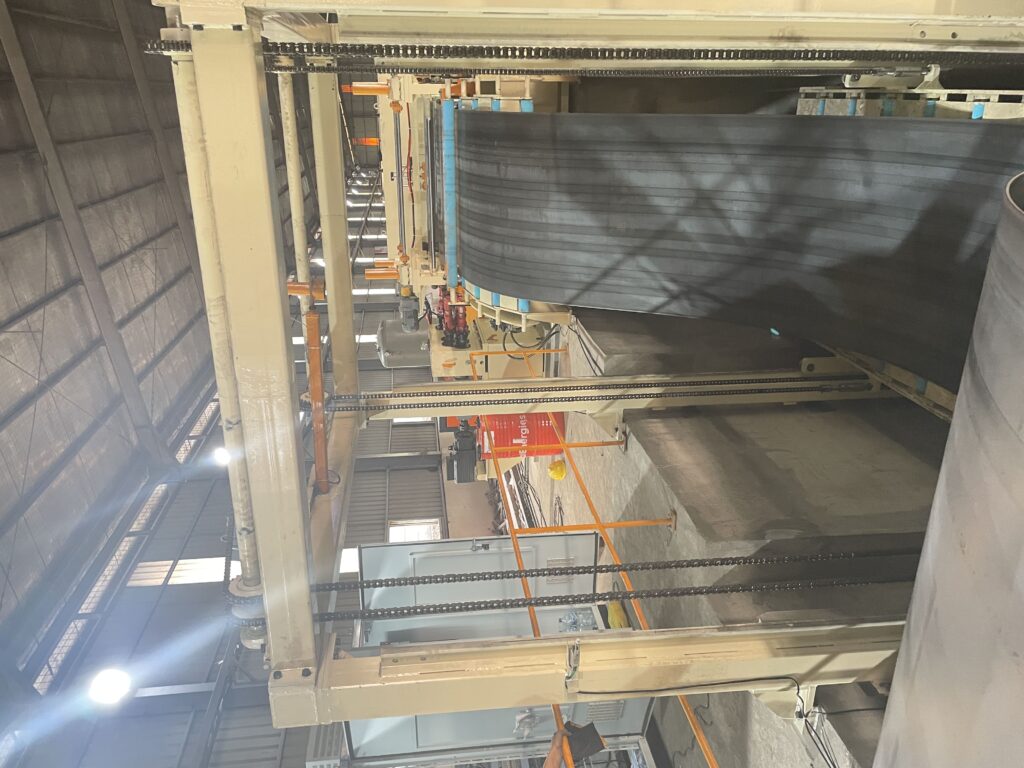MD-850 Precision Slitting Machine: Engineering Compact High-Speed Metal Processing
Complete engineering guide for MD-850 precision slitting machine: ±0.1mm accuracy, 250 m/min processing speeds in compact design. Technical specifications, implementation strategies, and performance optimization for metal processing facilities.
The MD-850 Precision Slitting Machine redefines compact metal processing by delivering industrial-grade accuracy within an exceptionally streamlined footprint. Engineered to meet the increasing demands of space-conscious manufacturing environments, the MD-850 achieves a cutting tolerance of ±0.1mm across a versatile width range of 20 to 820mm and thicknesses from 0.3 to 12mm.
This precision is fortified by an advanced integrated servo control system that synchronizes blade positioning with real-time feedback, alongside a state-of-the-art vibration dampening architecture to maintain stability at speeds up to 250 meters per minute. Proven in HVAC ductwork and appliance panel production, the MD-850’s design eliminates the compromises of larger machines, enabling manufacturers to maximize throughput without expanding their facility footprint. Its engineering excellence significantly reduces material waste and operational downtime, generating a rapid return on investment typically within 18 to 24 months.
Engineering Foundations of Compact Precision
The fundamental challenge in compact slitting design involves managing dynamic forces at high processing speeds. Traditional approaches relied on structural mass for stability, creating equipment footprints incompatible with modern manufacturing facilities. The MD-850 addresses this through servo-driven tension control and real-time force compensation systems that maintain cutting precision regardless of material variations.

Processing capabilities span materials from 0.3mm thin-gauge aluminum to 12mm structural steel, with working widths accommodating everything from narrow strips at 20mm to full 820mm coil processing. The 138.5kW power system provides sufficient torque for heavy-gauge materials while maintaining energy efficiency through variable frequency drive control.
Material handling represents another critical engineering consideration. The automated coil loading system handles weights up to 35 tons while maintaining precise centerline alignment essential for consistent strip quality. Servo-controlled mandrel expansion accommodates inner diameters from 508mm to 762mm without manual adjustment, reducing changeover time to under 45 minutes for most applications.
Precision Control Systems and Performance Metrics
Achieving consistent edge quality across varying material thicknesses requires sophisticated blade positioning control. The MD-850 employs servo-driven knife assemblies with positional accuracy of ±0.02mm, automatically adjusting clearances based on material hardness and thickness measurements. This eliminates the manual adjustments that typically consume 15-20 minutes per setup change.
The tension control system manages strip tension independently across multiple outputs, preventing the material distortion common in conventional systems. Closed-loop feedback from load cells positioned throughout the process path maintains tension variation within ±2% regardless of coil diameter changes or material property variations.
Surface finish preservation during high-speed processing depends on proper strip support and controlled entry angles into cutting zones. The MD-850’s strip guidance system employs adjustable rollers with precision bearings, maintaining surface contact pressure below levels that would mark finished surfaces while ensuring positional stability.
Addressing Critical Processing Challenges
Edge burr formation represents the primary quality concern in precision slitting operations. Burr height correlates directly with blade clearance accuracy and cutting force consistency. The MD-850’s automated clearance control maintains optimal gaps of 5-8% of material thickness, significantly below the 12-15% typical in manual systems.
Knife wear monitoring through cutting force analysis enables predictive replacement scheduling. Force signature changes indicate blade condition deterioration before edge quality degradation becomes visible, typically allowing 400-500 tons of processing between replacements for standard carbon steel applications.
Strip width accuracy depends on thermal stability of the knife positioning system. The MD-850 incorporates temperature compensation algorithms that adjust knife positions based on ambient temperature changes and operational heat buildup, maintaining ±0.15mm width tolerance throughout extended production runs.
Material-Specific Processing Considerations
Stainless steel processing presents unique challenges due to work hardening characteristics and spring-back behavior. The MD-850’s enhanced servo control compensates for cutting force variations inherent in stainless grades, while specialized knife metallurgy extends blade life beyond standard carbon steel applications.

Aluminum alloy processing requires different tension control strategies due to lower yield strength and surface sensitivity. The system automatically adjusts strip support roller pressure and entry angles when processing aluminum, preventing surface marking while maintaining dimensional control.
High-strength automotive steels demand increased cutting forces and more frequent blade replacement. The MD-850’s 138.5kW drive system provides adequate torque margins for these applications, while force monitoring enables optimization of cutting parameters for extended blade life.
Integration with Manufacturing Operations
Production workflow optimization involves more than individual machine performance. The MD-850’s coil-to-coil processing maintains downstream equipment efficiency by eliminating the accumulation loops required with sheet-fed systems. This direct integration reduces material handling costs and eliminates potential damage points in the process chain.
Quality control integration through automated width measurement provides real-time feedback for process adjustment. Statistical process control algorithms track width variation trends, enabling proactive adjustment before products exceed tolerance limits.
Maintenance scheduling optimization balances equipment availability with component reliability. Predictive maintenance algorithms analyze vibration signatures and electrical parameters to identify developing issues before failure occurs, typically reducing unplanned downtime by 60-70% compared to reactive maintenance approaches.
Safety Engineering and Compliance Integration
Modern slitting operations must satisfy increasingly stringent safety requirements without compromising productivity. The MD-850 incorporates redundant safety systems including dual emergency stops, light curtain protection, and interlocked guarding that prevents access to hazardous areas during operation.
Safety system design emphasizes fail-safe operation where system failures result in safe shutdown rather than continued operation in potentially hazardous conditions. This approach satisfies both OSHA requirements and CE marking standards for international deployment.
Operator protection extends beyond physical guarding to include ergonomic considerations in control placement and maintenance access. The elevated control platform provides clear sightlines to the entire process while positioning operators away from material handling zones.
Economic Performance and Operational Optimization
Return on investment calculations must consider both direct productivity improvements and indirect operational benefits. The MD-850’s compact footprint typically reduces facility costs by $15-25 per square foot annually compared to conventional systems, while energy efficiency improvements can reduce operational costs by 12-18%.
Material yield optimization through precise width control directly impacts profitability. Achieving ±0.15mm width tolerance compared to ±0.5mm typical of older systems can improve material utilization by 2-4%, representing significant cost savings on high-volume production.
Processing flexibility enables rapid response to customer requirements without extensive changeover procedures. The ability to process orders ranging from 20mm strips to 820mm full-width coils from the same equipment provides operational agility increasingly valued in competitive markets.
Technological Innovation and Future Developments
Industry 4.0 integration represents the next evolution in slitting technology. The MD-850’s control architecture supports advanced connectivity for production data analytics and remote diagnostics. This capability enables predictive maintenance strategies and real-time optimization based on actual operating conditions rather than theoretical parameters.
Artificial intelligence applications in process optimization show promise for further performance improvements. Pattern recognition algorithms can identify optimal cutting parameters for new material grades automatically, reducing setup time and improving first-run quality.
Environmental considerations increasingly influence equipment selection. The MD-850’s energy-efficient design and extended component life contribute to reduced environmental impact while supporting corporate sustainability objectives.
Implementation Strategy and Technical Support
The MD-850 Precision Slitting Machine exemplifies how advanced engineering converges with practical maintenance and operational excellence to sustain high-performance outcomes in demanding industrial settings. Beyond initial installation, the machine’s success hinges on a rigorous operator training program that equips personnel with comprehensive knowledge of both routine operations and critical troubleshooting techniques, ensuring uninterrupted precision and efficiency. In parallel, continuous process optimization driven by frequent performance evaluations allows for real-time parameter adjustments that adapt to varying material specifications and production demands, minimizing scrap and maximizing throughput.
MaxDo further enhances reliability through its cutting-edge remote diagnostic support system, enabling prompt issue resolution without delays associated with on-site service calls. This proactive technical assistance, combined with a tailored preventive maintenance schedule—incorporating predictive component replacement based on operating conditions—guarantees maximal uptime while controlling maintenance costs. Case studies from appliance and HVAC panel manufacturing underline the MD-850’s ability to maintain ±0.1mm accuracy at speeds up to 250 m/min consistently over its service life, all within a footprint 40% smaller than traditional systems. Ultimately, the MD-850 empowers manufacturers to achieve exceptional precision and throughput in constrained spaces without compromise, reinforcing MaxDo’s commitment to delivering scalable, space-efficient metal processing solutions that meet the rigorous demands of modern industry.
Related Technical Resources:




